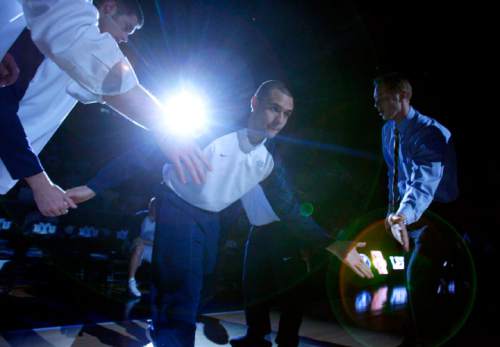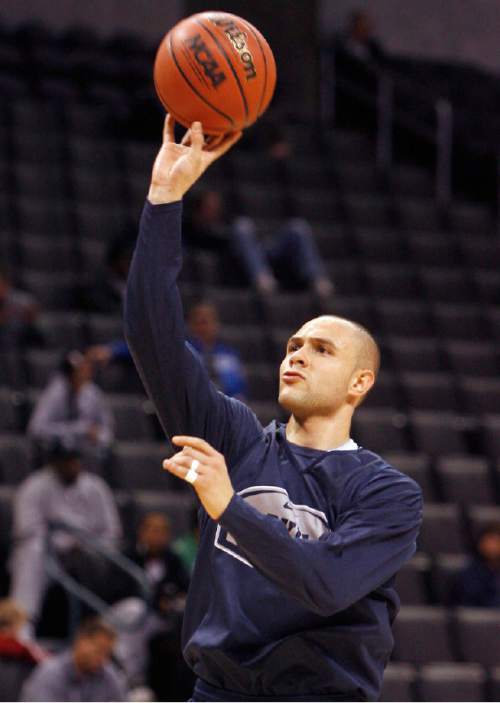This is an archived article that was published on sltrib.com in 2016, and information in the article may be outdated. It is provided only for personal research purposes and may not be reprinted.
Seeking some assurance about the Olympic experience awaiting me in Rio de Janeiro, I arranged to meet my all-time favorite Brazilian, Jonathan Tavernari.
This conversation would follow the tradition of asking for insight from natives of Olympic host countries, including my Chinese next-door neighbors, Canadian golfer Mike Weir and Russian basketball player Andrei Kirilenko, who promised me, "You'll love it."
To my surprise, after all of the concerns about security and other issues, I did love Sochi. So in my chat with Tavernari, a former BYU basketball star, amid reports of the troubles Rio is having in preparing for the Games, this became the critical question: "How can you assure me that it will all be ready?"
The problem? Tavernari rhetorically was posing that question, rather than me asking him. If A.K. was relentlessly encouraging about Sochi, J.T. was doggedly realistic about Rio.
As he described himself in comparison to his friend, Jazz guard Raul Neto, having played with him in Brazil's national team program, "I'm outspoken. He's completely the opposite of me."
Understand, Tavernari is a very friendly, engaging person, and he offered suggestions about my safety and satisfaction of covering the Games. He's hoping his homeland successfully stages the Olympics and makes a good impression, gloss over all of the problems regarding transportation, housing, pollution in outdoor water venues and crime. I mean, we've all heard about body parts washing up on Copacabana, site of the beach volleyball competition.
Tavernari laughed. "That ain't nothing," he said. "That's daily news."
And welcome to Brazil.
Having grown up in Sao Paulo, Tavernari attributes his excellent English partly to watching "The Fresh Prince of Bel-Air," although I wonder if Will Smith character's Philadelphia vernacular truly was a good influence or if he ever used "fiasco" as a verb. But J.T. sure made it work in this context.
"I'm Brazilian," he said. "I know there's going to be a way they're going to fiasco this."
And then one of us said, "You can't fault me for being worried."
Again, that was J.T., you know, trying to be helpful.
Russian President Vladimir Putin may have authorized doping-related cheating and other violations of the Olympic spirit, but I'm thankful to him for spending that $50 billion to make the 2014 Games work. That kind of money buys efficient transportation and dependable security, everything I want in an Olympics.
In contrast, Brazil's economy hardly resembles its levels of 2009, when the country was awarded the Olympics. And now, picturing these Games being staged in Chicago instead of Rio is only natural, if counter-productive.
Tavernari remembers being in Provo in '09 when the announcement came of Brazil's landing the Olympics. His first thought had nothing to do with pageantry or patriotism, but was just pragmatic. He wondered what they would do about the favelas, the slums within urban areas. Since then, plenty of other issues have surfaced.
Concerns emerge in the run-up to every Olympics, and then everything seems to turn out well. This might be the one time the problems overwhelm the Games, though. "I pray nothing bad happens," Tavernari said.
He'll watch the Games interestedly with his wife and 3-year-old son in Riverton, while preparing for another basketball season in Italy (he's half-Italian, as he likes to clarify). After breakfast, J.T. assigned me some homework in the interest of understanding the culture. The two "Tropa de Elite" movies would be instructive, he said — "a 100 percent accurate depiction of Rio de Janeiro," showing the interaction of drug lords and corrupt police.
Again, not helping.
Twitter: @tribkurt —
Rio's problems
• Housing: Faulty plumbing and exposed wiring led delegations from Australia and Argentina to move out of the Olympic Village, seeking hotels.
• Terror: Authorities this week arrested a 12th suspect in an alleged Olympics terror plot.
• Water quality: The Associated Press conducted water tests and found disease-causing virus levels linked to human sewage.
• Politics: President Dilma Rouseff awaits an impeachment trial.
• Crime: Street robberies in Rio de Janeiro increased by 24 percent in the first four months of the year, The Washington Post reported.







